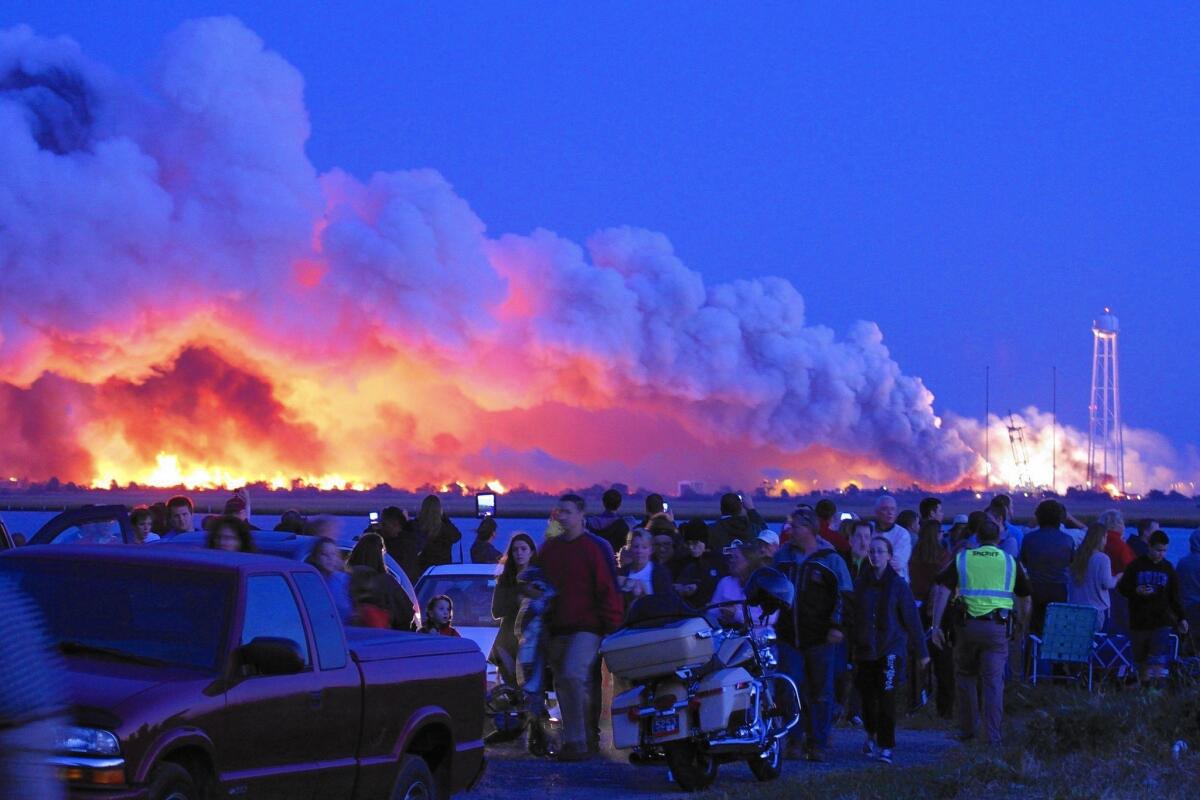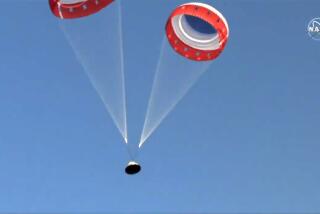Engine firm to pay Orbital $50 million after NASA launch pad explosion

- Share via
Nearly a year after Orbital Sciences’ rocket carrying supplies to the International Space Station exploded at liftoff, an aerospace company that had refurbished the ship’s aging Soviet-era engines has agreed to pay $50 million to the firm.
Orbital was operating the unmanned supply ship for NASA on Oct. 28 when it detonated in a fireball at a Virginia launch pad, costing taxpayers hundreds of millions of dollars.
Sacramento-based Aerojet Rocketdyne had imported the rocket’s 40-year-old engines in the 1990s, overhauled them and then sold them to the NASA contractor now known as Orbital ATK after a recent merger.
Both companies performed investigations into the fiery blast, which destroyed more than two tons of equipment and supplies needed onboard the space station. But both companies have refused to release any part of their reports, leaving the public in the dark about what caused the failure.
“Virtually all the data is proprietary, highly sensitive and subject to government controls on disclosure,” said Glenn Mahone, a spokesman for Aerojet.
Mahone said the payment settled all claims that the companies had against each other after the accident. Under the deal, Orbital will return its 10 remaining Soviet engines to Aerojet.
The companies’ settlement came after a Sept. 17 report by NASA’s inspector general that harshly criticized the agency’s handling of its contract with Orbital.
The watchdog said that NASA overlooked its own policy by allowing Orbital to lead the official investigation into the accident. The agency’s policy states that accident investigators should be independent from the team managing the launch of the rocket. “It is difficult to conduct an unbiased investigation of one’s own actions,” the policy says.
The inspector general also said that NASA had already paid Orbital $1.6 billion of the $1.9-billion contract even though the company has only twice successfully carried cargo to the space station. NASA and Orbital executives say the contract price will cover six more cargo missions.
Hawthorne-based SpaceX has a similar cargo contract with NASA, but its rockets are also grounded after one exploded just two minutes after liftoff from Florida’s coast April 28.
NASA had awarded cargo contracts to two companies in 2008 to ensure the agency had a supply ship available even if a rocket failed. Now NASA is left to depend on the limited amount of supplies it can ship with the Russians, as well as a Japanese cargo hauler that flew to the space station in August.
The inspector general said that NASA had written the contracts so that most of the cost of an accident fell to taxpayers. For example, neither company is required to re-fly a mission if it fails, and they still receive all but 20% of the contract’s price per flight.
NASA and Orbital executives had known about the risks of using the 40-year-old Soviet engines, which had sat in a warehouse for decades before Aerojet refurbished them. The engines had caught fire in ground tests at NASA’s Mississippi facility in 2011 and again in May 2014 — just five months before the cargo ship exploded.
Soon after the accident, Orbital said its preliminary investigation pointed to a problem in the turbo pump in one of the rocket’s two engines.
NASA says it is performing its own review of the accident’s cause — a report that is not yet complete.
In a response to the inspector general’s findings, NASA said it had managed the contracts with the interests of taxpayers in mind. The agency said it plans to change the terms of future cargo agreements based on the inspector general’s recommendations.
To continue with its obligations under the contract, Orbital plans to send the next shipment of cargo to the space station in December on an Atlas V rocket operated by United Launch Alliance, a joint venture of Boeing Co. and Lockheed Martin Corp.
Orbital is also redesigning its own rocket, known as the Antares, to fly with different engines that have been newly manufactured in Russia.
But the inspector general questioned Orbital’s plan for launching the redesigned Antares in March. The watchdog noted that Orbital does not plan a test flight of the new rocket or other experiments that would test the engines under conditions similar to those of flying.
The inspector general said that Orbital had bypassed similar “Test-Like-You-Fly” exercises of the aging Soviet-era engines in 2012. But NASA had agreed then to accept the heightened risks anyway, the inspector general said.
Sean Wilson, a spokeswoman for Orbital, said NASA had no reason to worry about a possible delay of the launch of the Antares.
“We are right on schedule and making great progress,” she said.
With NASA’s continuing payments on the cargo contract, Orbital has been recording rising profits.
In August, Orbital executives told Wall Street analysts that its second-quarter operating profit in the company’s space division, a large portion of which comes from NASA, had soared 167% over a year earlier.
Twitter: @melodypetersen
More to Read
Inside the business of entertainment
The Wide Shot brings you news, analysis and insights on everything from streaming wars to production — and what it all means for the future.
You may occasionally receive promotional content from the Los Angeles Times.











